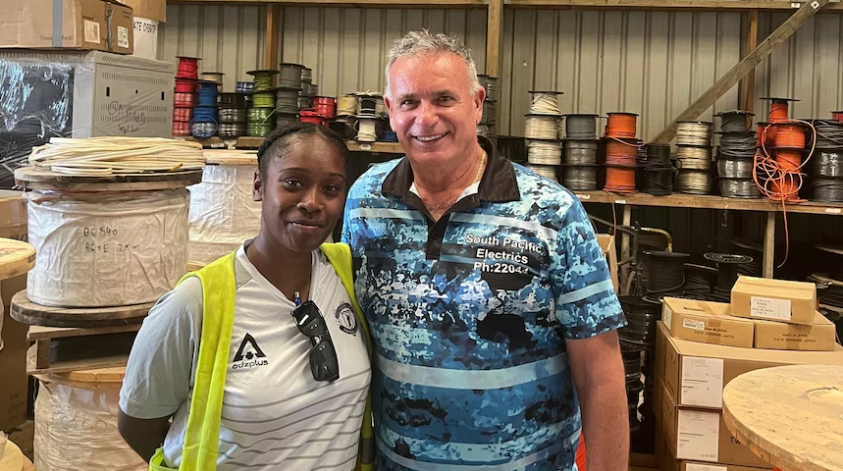Pacific Island nations are moving to gain control over their labour drains
Friday 26 April 2024 | Written by Supplied | Published in Pacific Islands, Regional

South Pacific Electrics owner Maurice Masuino, pictured with staff member Verenaisi Leinaleo Manaroto, is trying to recruit staff amid a shortage of electricians in Vanuatu. (Supplied: Maurice Masuino)/24042605
For Maurice Masuino, recruiting a new electrician will take an international search.
His Vanuatu business, South Pacific Electrics, lost 10 per cent of its staff to seasonal work in Australia and New Zealand, and electricians are in short supply at home.
Those remaining at the business are feeling the pressure as large projects approach.
"We've managed to shuffle things around, but it's made it really, really difficult for us," Mr Masuino said.
It's one of many trades and occupations listed as facing shortages — including in the country's vital tourism sector — as thousands of ni-Vanuatu leave for popular labour mobility schemes.
For workers, the schemes are a chance to earn higher wages, save money and build homes despite cost of living pressures at home.
But business leaders are calling for urgent fixes to the labour shortages.
Vanuatu Chamber of Commerce and Industry (VCCI) president Antoine Boudier said some businesses advertising positions locally are encountering silence.
"There is utterly no-one replying to it. And the people replying to those positions may not have the qualifications," he said.
Vanuatu is looking abroad for a short-term solution, importing its own foreign workers and creating an emergency visa aiming to bring in 1,500 people.
But early results are mixed as businesses look to recruit more staff from overseas.
Elsewhere in the Pacific, Samoa and Tonga plan to prevent labour shortages by gaining more control over which workers join labour mobility schemes.
Experts say the changes could help Pacific Island nations, but that officials could struggle to pursue them as they're inundated with other priorities.
In Vanuatu, workers have arrived from the Philippines and Fiji, while some businesses are looking to hire from Bangladesh, Sri Lanka and Mauritius, Mr Boudier said.
But only 200 people have applied for the emergency visa after a year, even though the visa has less red tape.
One problem is the visa only lasts 12 months, and cannot be renewed or extended — making it less appealing for foreign workers considering a move to Vanuatu, he said.
"It has created a little dilemma at that level."
The VCCI said the emergency visa program, which it helped facilitate, is now on hold as the business community waits to speak to the government about a review.
Vanuatu's Minister for Internal Affairs Johnny Koanapo was approached for comment.
Griffith University expert in labour mobility Kirstie Petrou said while Vanuatu's new emergency visa was meant to bring in workers more quickly, employers reported using other options.
"Employers are still preferring to go with that more traditional work visa because they get a longer period for which they can use the particular employee that they've brought into the country," she said.
Mr Masuino hired an electrician from Australia using the emergency visa, and said it offered him a solution even with its flaws and delays.
Bringing in a worker using the visa involved arranging police clearances, paperwork and a long wait for immigration approval.
"It's not a simple two minute process, it's quite a lot of work," he said.
Pacific Island nations have been reviewing their labour mobility policies since an explosion in the number of workers joining the schemes in Australia and New Zealand since COVID.
The amount of visas issued to workers participating in Australia's Pacific Australia Labour Mobility scheme and New Zealand's Recognised Seasonal Employer scheme nearly doubled to 48,000 between 2019 and 2023.
The percentage of working age people in the schemes hit double digits for Vanuatu (11.5 per cent) and Tonga (11.4 per cent) and reached 6.4 per cent for Samoa in 2023.
More recent numbers suggest that demand for Pacific Islander farm workers is falling in Australia.
In another post-pandemic change, Pacific Island governments have become more willing to voice their concerns about labour mobility schemes, Dr Petrou said.
"Governments were often quite reluctant to speak out if they thought things weren't working for them," she said.
"As numbers have increased, they're much more willing to speak out and say, 'Hang on, we need to look at this issue. We're experiencing this problem. Let's talk about it and see what kind of solution we can come up with'."
One of their concerns is that the schemes now employ more skilled people who already have jobs — even though they were originally meant for unemployed or unskilled people.
And in Tonga and Samoa, labour mobility schemes add to pre-existing migration to New Zealand and Australia, Dr Petrou said.
"When you've got that occurring alongside those other migration streams, it is feeling like a lot of people are leaving, and either not necessarily wanting to come back or not seeing employment in Samoa or Tonga itself as being a long-term plan," she said.
Both countries plan to change the type of workers joining labour mobility schemes.














































